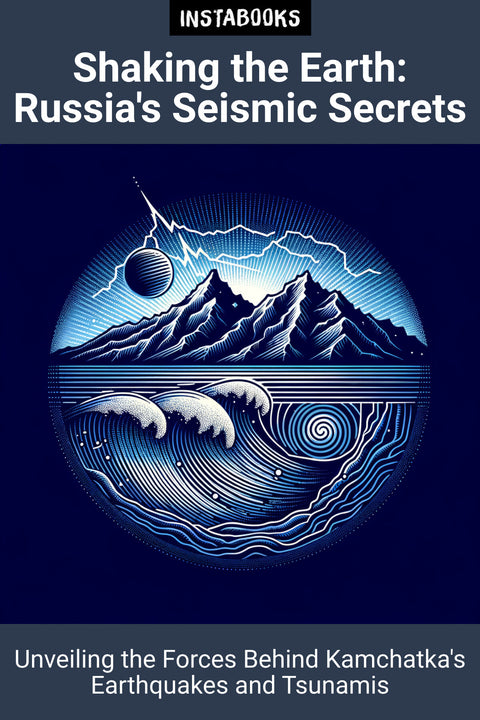
Shaking the Earth: Russia's Seismic Secrets
Unveiling the Forces Behind Kamchatka's Earthquakes and Tsunamis
Included:
✓ 200+ Page AI-Generated Book
✓ ePub eBook File — read on Kindle & Apple Books
✓ PDF Print File (Easy Printing)
✓ Word DOCX File (Easy Editing)
✓ Hi-Res Print-Ready Book Cover (No Logo Watermark)
✓ Full Commercial Use Rights — keep 100% of royalties
✓ Publish under your own Author Name
✓ Sell on Amazon KDP, IngramSpark, Lulu, Blurb & Gumroad to millions of readers worldwide
$149.00
$299.00
Title
Explore Russia's Seismic Landscape
Russia, with its vast and varied geography, is home to some of the world's most dramatic seismic activities, particularly along the Kamchatka Peninsula. "Shaking the Earth: Russia's Seismic Secrets" delves into the geological forces that shape this fascinating region, revealing the mechanisms behind powerful earthquakes and the resulting tsunamis. This book offers an in-depth analysis of the country's seismic landscape, making it vital reading for anyone interested in geology, natural disasters, or Russian geography.Historical Earthquakes and Their Impacts
The 1952 Kamchatka Tsunami stands out as one of the most catastrophic seismic events in history, with waves that reached across the Pacific. "Shaking the Earth" explores this event in detail, examining the devastation it caused and its lasting impact on infrastructure and communities both locally and internationally. It also covers other significant earthquakes in the region, offering insights into their causes and the lessons learned from each disaster.The Science Behind the Shakes
What causes these massive earthquakes? "Shaking the Earth" breaks down the complex tectonic interactions at play in Russia's seismic zones. With clarity and engaging detail, the book explains the subduction of the Pacific Plate beneath the Okhotsk Plate—a tectonic ballet that results in the powerful forces behind Kamchatka's earthquakes and tsunamis.Impact on Infrastructure and Preparedness
Understanding the impact of these seismic events on infrastructure is vital. The book details the destruction caused by historical earthquakes, particularly focusing on the 1952 tsunami's severe damage to buildings, transportation networks, and communication systems in Kamchatka and beyond. Learn about the evolution of preparedness strategies, from early warning systems to modern evacuation protocols, ensuring communities are better equipped to handle future seismic threats.Looking Ahead: Modern Challenges and Solutions
As the book draws to a close, it looks toward the future. "Shaking the Earth" discusses ongoing research and technological advancements aimed at predicting and mitigating the effects of earthquakes and tsunamis. The focus on the Pacific Tsunami Warning Centre and other international efforts provides readers with an understanding of global collaborations in disaster management, urging for continued vigilance in earthquake preparedness worldwide.Table of Contents
1. The Geology of the Kamchatka Peninsula- Tectonic Foundations
- Seismic Characteristics
- Influence on Russian Geography
2. Historical Seismic Events in Russia
- The 1952 Kamchatka Tsunami
- 18th and 19th Century Quakes
- Learning from Tsunamis
3. The 1952 Kamchatka Tsunami: A Closer Look
- Genesis of the Tsunami
- The Impact Across the Pacific
- Aftermath and Recovery
4. Tectonic Forces at Work
- Subduction Zones
- Plate Movements
- Triggers of Earthquakes
5. Understanding Tsunamis
- Formation and Behavior
- Historic Tsunami Events
- Predictive Science
6. Seismic Energy and Its Release
- Measuring Earthquake Magnitude
- Energy Comparisons
- The Science of Shaking
7. Impact on Infrastructure
- Damage Analysis
- Historical Infrastructure Failures
- Modern Engineering Responses
8. Preparedness and Response Strategies
- Early Warning Systems
- Community Preparedness
- Evacuation Protocols
9. The Role of Technology in Seismology
- Modern Seismographic Equipment
- Data Collection Techniques
- Predictive Modelling
10. Global Perspectives on Earthquake Studies
- International Research Partnerships
- Global Data Sharing
- Collaborations in Disaster Management
11. Lessons Learned from Past Disasters
- Case Studies
- Policy Changes
- Improving Future Responses
12. Future Challenges and Innovations
- Emerging Technologies
- Adapting to Climate Change
- Innovations in Building Resilience
